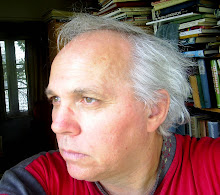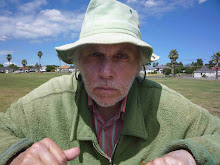Birth From Earth
In the slosh the slush of consciousness
And from the mud of blood:
Order from slime and sparks from dark
Did fire this flesh:
And when the brain began to thump
O gone by god was God, thus spake.
And when the black began to pump
Then were we alone alone:
We spun and shuddered in our ecstasy
Upon this bloody stone.
Crafting hearts do wait in wombs
And Death laughs out:
He clatters like the Tin Drum Man
The world up downs; but it don’t mind.
A thousand clapping clowns gyrate,
They have no heads, for it is birth from earth
That they do celebrate. Ho! Ho! Ho!
Silence laughs, and grins, and leers and sneers:
Or so we apperceive.... the subtle snake, the gecko, or the crocodile....
O you smile you smile you mathic son of man!
But crickets green in coats of gold are busy munching up:
They sing the numbers of the world,
And girls with violins
Are just like they. Bibles burn! Burn!
The hand that holds a pen
Is as subtle as a billion flies.
....................................................................................................................................................................
.jpg)



4 comments:
Thanks very much for this Richard. Poetry is an obsession of mine so I’ve taken the liberty of analysing it in the way I do every single poem I come across.
The theme is interesting and I admire the way you’ve matched the form to your subject (something I personally have trouble with). Also, there are some touches of wild brilliance that I really like: "thus spake", the lilt of the second stanza, "alone alone" and the final two lines.
That said, I strongly think "Birth from Earth" would benefit from revision. Here is why:
If I am reading the poem properly, its aim is to create the effect of psychic disturbance by means of jagged, disjointed language – something like King Lear. To me, though, it reads more like Edgar’s speeches as Poor Tom, ie a clever but ultimately unconvincing attempt to feign mental distress (through the use of nursery rhymes and crazy-talk clichés etc.).
I would be interested to see another version, but with these adjustments:
* eliminate internal rhyme (birth/earth, leer/sneer, slosh/slush). Why? The title and first stanza establishes a strong pattern, which is abruptly broken in the fourth line. You might argue that the broken pattern enhances the effect of disturbance, but my feeling is that rhythmical/prosodic consistency are important for keeping the reader’s attention.
*modernise or edit outdated diction ("by god", "it don’t mind", "Ho! Ho! Ho!", "Tin Drum Man", "did fire", "O", "do wait", "do celebrate"). If you want to add antique gloss, then use something outrageously arcane, otherwise it looks like you’re failing to imitate older poets.
*Unless you are completely sure that the context requires or explains them, avoid innovations, eg "the world up downs", "munching up", "just like they". (By the way, what is ‘mathic’? Do you mean ‘mantic’?)
*be wary of clichés because they can cast a unwanted comic slant on your images:
--"A thousand clapping clowns gyrate,
They have no heads,"
This might have worked if it was a new image but as it is it recalls a slew of B-grade horror flicks (and sitcom jokes):
http://www.amazon.com/MOVIES-OF-THE-CLOWN/lm/2C49GURA63S3Y
--Similarly, "Burn Bible, burn!" echoes an episode of The Simpsons in which an imaginery leprachaun offers Ralph Wiggum a match and tells him to "Burn, laddie, burn!"
--"Crickets green in coats of gold" reminds me of Jiminy Cricket.
Feel free to reject all of the above, of course. I tend to get carried away when I am reading anything I enjoy.
Lamad -
Thanks a million for your input here!
Some points "thus spake" is an echo of "Thus Spake Zarathrustra" in which the old man comes down from the mountain and asks: "Doesn't everyone know that God is dead?"
I wrote this poem very rapidly as I did many of these poems around 1990-2 as I wrote for an audience - that is live readings in Auckland - I used to write two or three poems a week. Some took me a few minutes to write. Hence - partly - this Blog - to give me a project and slow my writing down.
Decisions about the poem were made almost instantly and I didn't revise (I very rarely do) I just rejected those poems I didn't feel were good - this worked well as a performace piece (I eventually made it part of a performance on stage) ... it was when I was strongly atheistic with kind of anti atheistic fascination as a kindof back emnf to that with the why of everything -
"mathic" I invented - a mathic and is mathematical or logical man if you like. But there is thus deliberately generated a contradiction... "Son of man" echoes Eliot who echoes (I forget the which book of the Bible). The girl(s) with a violin " - I was thinking of my daughter who still plays the violin - at that time she was about 12 - she used to sometimes wake me by coning into my room playing the violin!.
Yes King Lear is there - I the sense of the desolation - the reduction of man to bare forked animal - and of everything to numbers ("They sing the numbers of the world") - that is differences -it worked out or had theory of differences (I didn't know of Derrida's theories BTW -haven't read much of Derrida) - the Universe had no meaning it was just combinations of differences (numbers). All that had happened was many many random events (evolution) from the (possibly from the) Big Bang origin if we can talk of any "starting point" to the Universe) - hence the hand is a subtle as (the random movements) of a billion flies - that said after I had written it I saw a lot more in it than that [it is also very much a surealist image] - The clowns celebrate birth from earth - not from God or whatever [perhaps I got this idea from my study of Wallace Stevens] - but the question is still there and the mystery of existence comes in the italicised part. This enters despite my "atheism" - I was more of a Richard Dawkins then but not so much of one now. (Although I recognise he is a great writer on science and biology).
It is not a perfect poem but I don't believe in such - I am actually interested in many imperfection, error, and imperfections; and very focused on the idea of many versions of any poem or poems - that is one of the concepts of the 'The Infinite Poem' -now I was once fascinated to see Alan Curnow's many versions of one of his poems on display at the Auckland Univeristy - now what I was most interested in was the sum total of all those variants as process or processes leading to the poem and even past the poem. For me there would be no final or perfect poem. This is the keystone of everything I am doing now. I am always -when I see all these variations - and I like to see the crossings out also - disappointed in the final work. Ideally I would keep everything in - everything - all versions in. The smudges even. Even - especially - the ones with "crossings out". I want the total process -and text drawing attention to itself and even to the author. (Which jumps the question of "authorlesness"...but more anon.)
You are right - if this was poem I had put up as something to be submitted say to Landfall (NZ LIT Mag) - an astute critic would tear it apart...but it is in context here as a part of Eyelight and as a part of the ongoing dialogue we are having - really about my poem - project - one of whose tenets is in fact a move away from such perfected poems as Curnow and others did. Of course when I wrote it I didn't have such a theory; I was simply lazy! - I knew it would work as perfomance. Its use to me now is in fragmenting it - you saw the final 2 lines I had taken out of it.
I accept your criticsms. They are interesting (and I was well aware of the weaknesses if we were talking of conventional poetry and so on). I don't write poems like that one these days. But I will look very closely at what you have said.
When I wrote it a lot of what I wrote gave that sense of "psychic disturbance" and this is indeed what I did in my poems that are in my latest book - just published - called "Converstion with a Stone" by Richard Taylor (Titus Books) aad in particular in poems influenceed by my seeing Oliver Sacks on TV and other things (my mother's death) - those poems (not all the ones I needed are in there though) are in a section I called "Gareth Farr's Wasp Factory"... The paranoia or 'psyhic disturbance' is definitely there...
And I was to some degree - but these days I am very happy in my life!
I am convinced that Eyelight - a textual project has far more validity or power than any single poem - it is a total process (ongoing) - not a single poem or poems - I don't really believe (or have so much interest in doing) single poems.
My suggestion - and I am not being satirical -is that your re-write it - even possibly in several versions - we could do it together - the ..and I will (or I could) publish the result or results on here on my Blog - which is an ongoing poem which probably does require input from others... especially as it moves toward being The Authorless Infinite Poem - but more of that anon.
I would also like to know more about you -who you are and so on. (If you dont feel like saying anything about that that is ok).
lampad. BTW the line beginnings: "And when.. " etc are probably borrowed from Blake's "Tyger" - a very great poem - one of my favourite poems - now in the case of that poem it is difficult to apply the "warts and all theory" as in my previous comment before.
King Lear BTW is a very great, dark, tragic, almost nihilistic; and a powerful play - my favourite of Shakespear's.
Kind regards.
I accept the critique of this poem of mine - but as to B Grade movies etc - I was or am not really aware of these images - this conventional approach to poetics doesn't work with the way I write - that said "Birth from Earth" I have always had reservations about and I am actually pleased this critic took the time to point out his reservations.
The poem was inspired by the sound of a toilet flushing in a room near to mine!
Hence "The slosh the slush..."
The poem is in one sense "about" evolution" (Birth from earth - the origins of life) and the numbers are the infinte varieties or some of which lead to the inception of life - it "says" life has no meaning & that we are in a
senseless world but in saying it ironically or whatever tries to convey a "deep sense' of something...
Post a Comment